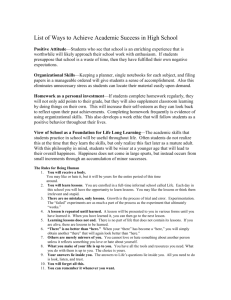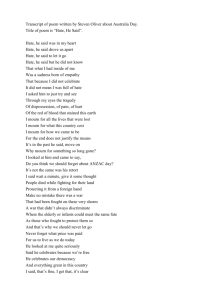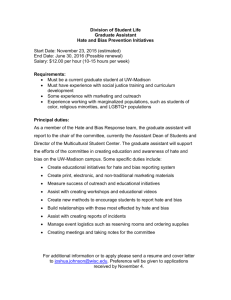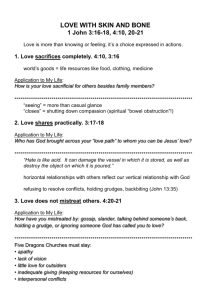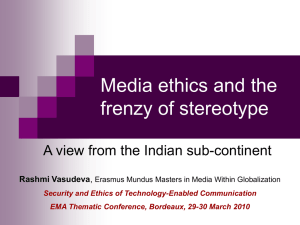here - OC Human Relations
advertisement
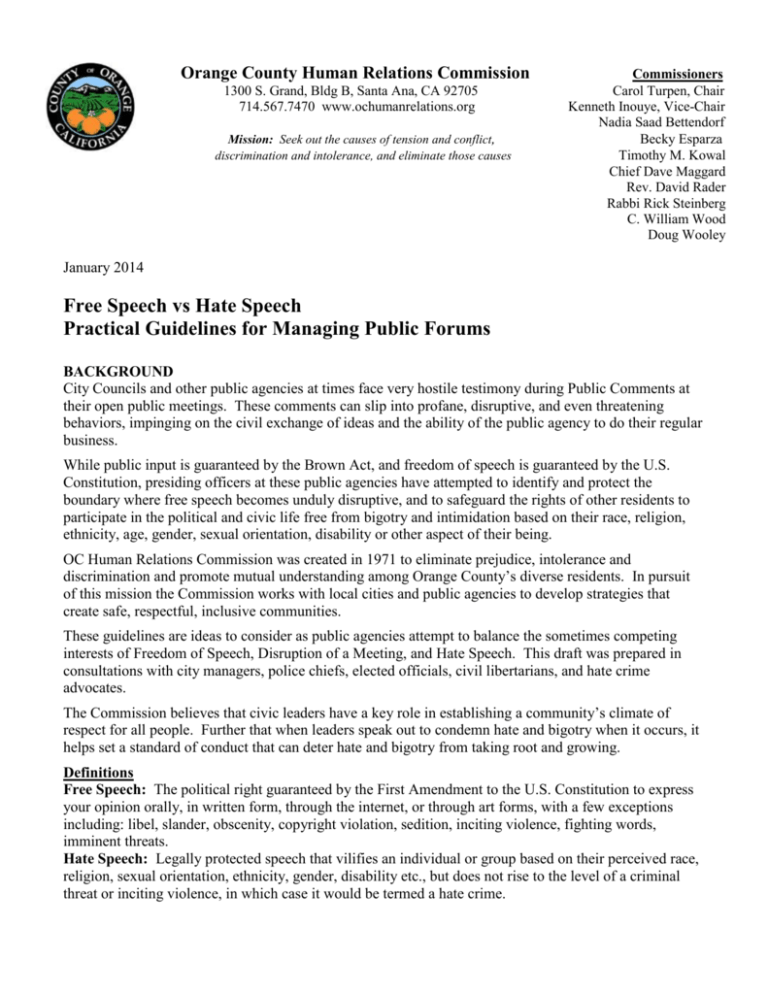
Orange County Human Relations Commission 1300 S. Grand, Bldg B, Santa Ana, CA 92705 714.567.7470 www.ochumanrelations.org Mission: Seek out the causes of tension and conflict, discrimination and intolerance, and eliminate those causes Commissioners Carol Turpen, Chair Kenneth Inouye, Vice-Chair Nadia Saad Bettendorf Becky Esparza Timothy M. Kowal Chief Dave Maggard Rev. David Rader Rabbi Rick Steinberg C. William Wood Doug Wooley January 2014 Free Speech vs Hate Speech Practical Guidelines for Managing Public Forums BACKGROUND City Councils and other public agencies at times face very hostile testimony during Public Comments at their open public meetings. These comments can slip into profane, disruptive, and even threatening behaviors, impinging on the civil exchange of ideas and the ability of the public agency to do their regular business. While public input is guaranteed by the Brown Act, and freedom of speech is guaranteed by the U.S. Constitution, presiding officers at these public agencies have attempted to identify and protect the boundary where free speech becomes unduly disruptive, and to safeguard the rights of other residents to participate in the political and civic life free from bigotry and intimidation based on their race, religion, ethnicity, age, gender, sexual orientation, disability or other aspect of their being. OC Human Relations Commission was created in 1971 to eliminate prejudice, intolerance and discrimination and promote mutual understanding among Orange County’s diverse residents. In pursuit of this mission the Commission works with local cities and public agencies to develop strategies that create safe, respectful, inclusive communities. These guidelines are ideas to consider as public agencies attempt to balance the sometimes competing interests of Freedom of Speech, Disruption of a Meeting, and Hate Speech. This draft was prepared in consultations with city managers, police chiefs, elected officials, civil libertarians, and hate crime advocates. The Commission believes that civic leaders have a key role in establishing a community’s climate of respect for all people. Further that when leaders speak out to condemn hate and bigotry when it occurs, it helps set a standard of conduct that can deter hate and bigotry from taking root and growing. Definitions Free Speech: The political right guaranteed by the First Amendment to the U.S. Constitution to express your opinion orally, in written form, through the internet, or through art forms, with a few exceptions including: libel, slander, obscenity, copyright violation, sedition, inciting violence, fighting words, imminent threats. Hate Speech: Legally protected speech that vilifies an individual or group based on their perceived race, religion, sexual orientation, ethnicity, gender, disability etc., but does not rise to the level of a criminal threat or inciting violence, in which case it would be termed a hate crime. OC Human Relations Free Speech vs Hate Speech Practical Guidelines for Managing Public Forums PAGE 2 Practical Guidelines 1. Adopt a Code of Conduct: post them so they are visible to all attendees, attach to the speaker request forms, and post them on the podium where a speaker may place their notes. A Code of Conduct as it pertains to what a person says, should be thought of as “guidelines” that you promote not necessarily “enforce”, including: a. No profanity or obscenity. b. Refrain from personal threats or attacks. c. Respect all people. d. Refraining from hateful epithets and demeaning language based on hate of a person’s race, religion, sexual orientation, ethnicity, gender, or disability. e. No yelling or screaming. (This one you can enforce) f. Respect all people that are present or watching. g. Obey the direction of the Presiding Officer as to when and how long they can speak. (This one you enforce). 2. Understand the difference between offensive speech and ACTUAL disruption of a meeting. a. During public comments individuals have a right to say whatever they wish, as long as it does not disrupt the meeting. So they can swear, use hate epithets, say horrible things about councilmembers and staff and others etc. So long as it does not disrupt the meeting, these are within their legally protected right to freedom of speech. b. Things that disrupt the meeting are NOT within their rights such as: i. Exceeding their allotted minutes, (usually 3 minutes), ii. Yelling and screaming in a way that upsets the public and council to the point of not being able to continue the meeting, iii. Excessive profanity or slander, iv. Speaking without being recognized by the presiding officer, v. Specific threats that they are capable of following through on, vi. Inciting violence, or “fighting words”, vii. Issues that are not in the subject matter jurisdiction of the body, (this may be difficult to know without listening to the testimony which might seem to start off topic, but then a connection is made. This is a judgment call, but most horrible things are within their rights to say. 3. Manage Hate Speech at Public Meeting: Strategies for managing a hateful speaker while protecting the first amendment right to speak include: a. Stop the meeting to consult with your attorney for advice. If you think that a member of the public is disrupting the meeting by going over these lines, stop the meeting to ask for advice from the City Attorney. This will allow for a cooling off before reacting in the heat of the moment. b. Gavel and/or Mute Microphone: When bigoted epithets, profanity, personal attacks and other odious things are said the presiding officer can gavel to silence and/or mute a speaker’s microphone: i. If the presiding officer gavels a member of the public to silence, or mutes their microphone, they should also, MISSION: Seek out the causes of tension and conflict, discrimination and intolerance, and eliminate those causes. OC Human Relations Free Speech vs Hate Speech Practical Guidelines for Managing Public Forums PAGE 3 c. d. e. f. 1. Inform them that their language, bigotry, hate, epithets, profanity, etc. are unwanted, unwelcome, and inappropriate, and that they interfere with the ability of those present to listen or take any of their points seriously… But not restrict or prohibit them from saying these words. 2. Allow other members of the council to use their free speech right to make statements condemning and abhorring the words of the speaker, but they should also reassure the speaker that they have the right to say them anyway, and 3. Inform the speaker that they will be given the full three minutes they are entitled to, in order to say whatever they wish. ii. The important point is that the presiding officer MAY NOT ORDER the person to stop saying whatever he/she is saying, even when it is very offensive. iii. In many cases it may be better to wait out the 3 minutes and then make statements, rather than getting into a back and forth with the problematic speaker. iv. Schedule a Council Members Comments section right after Public Comments to allow all members of the City Council or other public body, to share their perspectives, publically state their objections to the hate and bigotry that might have been aired in the Public Comments section, and return to a more civil, respectful meeting environment. Police Warning and Removal from Meeting: Uniformed law enforcement officers can help control this behavior as well as effect removal if the behavior warrants it. Elected officials need to keep in mind that they should not be publically prescriptive in telling police to remove an individual, rather ask for police intervention, seek advice of your attorney, and allow the law enforcement professional to make the judgment call about how to control the situation. They may want to take into consideration such things as the individual’s likely reaction, progressive steps of warnings, audience reaction, minimizing use of force, preventing violence, objective standards of enforcement, definition of “disruption”, etc. Police efforts to establish rapport with diverse communities, especially before they are at the public podium, can help police be positive “influencers” in controlling some potentially challenging members of the public. Calling for a Break in the Meeting: If the conduct is not brought within control or additional speakers or audience members continue the disruption, consider calling a break for a few minutes before proceeding. This can cool down anger and give community relations staff (police or otherwise) to talk with the members of the public and establish some respect that can bring more civil behavior upon resumption of the meeting. Clearing the Room: If the meeting is willfully interrupted, and you have consulted your attorney for an objective legal opinion of that judgment, and asked police to intervene and effect warnings and ultimately remove an individual, you can also have the room cleared before proceeding. Clearing the room can be done if you find the disruptions to be preventing you from doing the people’s business which is conducting the public meeting. Members of the press, unless involved in the disruption, shall be allowed to remain in the session while the remainder of the agenda items are discussed and acted upon. You may also set rules for readmitting individuals IF you wish. Adjourning the Meeting: If the other tactics do not control the disruption, the meeting can be adjourned to a future time when the business of the public body can be continued. MISSION: Seek out the causes of tension and conflict, discrimination and intolerance, and eliminate those causes.
